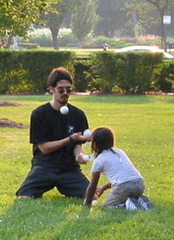There must have been close to twenty people watching nearby.
At first, I just continued walking. I was tired and it was close to finals for school.
After a few steps, I stopped myself. I went up to someone and asked if he had called the cops. He laughed.
I dialed 911, and told the dispatcher what was happening. She asked whether I saw a weapon, and I said I didn’t. The beating continued as I described the scene. After a few moments, I heard sirens in the distance. The guy managed to briefly escape and began stumbling down the street with the other man chasing him. People laughed.
The cops arrived and began pursuing them. I continued my walk home.
I was struck then by how easy it was to be a bystander.
After a devastating earthquake in China, the classical liberal and free-market economist Adam Smith reflected that injustice and suffering remains unanswered because we care more about our pinky finger than a million deaths. In his thought experiment, Smith argued we would still sleep soundly knowing a million people died that day. We would be much more “disturbed” by the thought of losing our pinky the next day, or of our sports team losing a game, or of failing a test. The death of millions could be shut out of our mind.
And it’s true that we’re only human. But maybe that sentiment is the problem. We use our humanity as an excuse. Instead of as a call to become better.
My blog is titled “What we will become tomorrow.” It is a quote from Paul Rusesabagina about his fellow Rwandans, who in the summer of 1994 picked up machetes and butchered and tortured and raped their neighbors in an orgy of violence orchestrated by the Hutu Power. Rusesabagina, who saved over a thousand from the genocide, reflected that the problem with his countrymen was you never knew what they would become tomorrow.
But Philip Gourevitch was right that this was also a hopeful sentiment in a way. If tomorrow is unwritten, if each day is in some imperfect sense a blank slate, then we can write on it what we wish. We can decide to be bystanders. Decide to passively go along with injustice, and ignore the injunction on the walls of the Holocaust Museum - “Thou shalt not be a bystander.” Or we can decide to work on our weaknesses and failings, and try to live up to the best in ourselves.
Perhaps it’s our cynicism that holds us back. But Greek Cynics were actually strong believers in self-improvement. First outlined by the philosopher Antisthenes in the late 5th century BCE, Cynics were skeptical about human nature; they were pessimistic about the selfishness and cruelty of man; they believed overcoming the worst in humanity was hard and difficult, but they weren’t “cynical.” Cynics believed that people could become better, and their philosophy was a testimony to that challenge. They believed in self-sufficiency and discipline, and achieving happiness through a life of virtue and harmony with nature. They believed that people could come to represent the best in humanity, if they were willing to be disciplined and work at it. In that sense, Cynics were optimists.
Most of us will work hard at our careers, our studies, and our hobbies, but we rarely devote the same energy, care, and discipline to the things that really matters. We don’t devote ourselves to studying the art of living, how to love better and stronger than before, how to better care for our family and friends, and how to be more empathic and kind.
All this is just my long-winded way of saying two things. First, we’re bystanders all the time. There is horror and suffering all around us, and we remain content to keep walking on by. Put it out of sight, and out of mind. Second, tonight I leave on another adventure. Just me and the open road. It can be a lonely path. Let’s hope this latest adventure is a journey as well.
Happy New Year.
